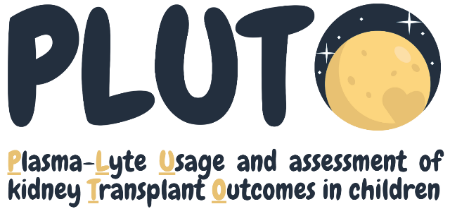PLUTO
Plasma-Lyte Usage and assessment of kidney Transplant Outcomes in children
The PLUTO study is now complete.
Chief investigator: Dr Wesley Hayes
Primary sponsor: Great Ormond Street Hospital for Children NHS Foundation Trust
Funder: National Institute for Health Research

Study status
PLUTO recruitment closed in August 2022. The study ended in February 2023.
Summary
Kidney transplantation transforms the lives of children with severe kidney disease. It allows many to return to a life without frequent hospital visits or dialysis treatment. But the transplant itself is a big operation.
In the first few days after kidney transplant, many children develop dangerous changes in the amount of salt and water in the bloodstream. This is because doctors give very large volumes of artificial fluids into the veins to keep the new kidney working.
If the main salt in the blood (sodium) falls too far, serious problems including brain damage and even death can occur.
Because of this, we take blood samples from each child every 2-4 hours for the first day after the transplant operation to check sodium levels and change them if necessary.
Study hypothesis
This research aims to compare the standard fluid used after the transplant operation with an alternative that may reduce dangerous changes in salt levels and help the transplant kidney to work better.
The new fluid is called PlasmaLyte. It matches the normal composition of blood more closely than standard fluid.
PlasmaLyte is already used in other sick children, including those on intensive care units. Although there are good reasons to believe that PlasmaLyte may be a safer choice of fluid for children after kidney transplant, there is no evidence comparing PlasmaLyte with standard fluid for children.
We plan to work out which of the two fluids is better by looking at children’s kidney transplants in the UK, half using the standard fluid and half using the new fluid.
The choice of fluid will be made randomly by a computer. We will compare the number of children in each group who have low blood salt levels, and their kidney function. No additional blood samples will be required. Children who participate in the study will continue to have all the usual care they would otherwise receive.
Study design
National multi-centred open label randomised controlled trial.
Study results
Kidney transplantation transforms the lives of children with severe kidney disease. It allows many to return to a life without very frequent hospital visits or dialysis treatment, but the transplant itself is a big operation. In the first few days after kidney transplant, many children develop dangerous changes in the amount of salt, water and acid balance in the bloodstream. This is because doctors give very large volumes of artificial fluids into the veins to keep the new kidney working.
We aimed to compare the standard fluids used after a transplant operation with an alternative called Plasma-Lyte. One hundred and forty-four children from nine hospitals took part in the PLUTO research study. Half of them had standard fluids, and half of them had Plasma-Lyte. We compared the number of children who developed abnormal levels of salts and acid balance in their bloodstream after their transplants.
The number of children who had low levels of sodium (the main salt in the blood) was similar in those who had standard fluids and Plasma-Lyte. More of the children who had standard fluids developed high levels of chloride and acid imbalance in their blood. Children allocated to standard fluids also had more adjustments to their fluid prescriptions made by doctors. For these reasons, doctors may now change to giving Plasma-Lyte to children having a transplant.
We will tell other doctors, nurses and surgeons about these results at conferences. We have submitted the results to a medical journal to be published for everyone to access. We are working with our patient and parent team members who helped to design this research, to inform patients and the public of the results more widely.
Publications
Hayes W, Laing E, Foley C, et al. Multicentre randomised controlled trial: protocol for Plasma-Lyte Usage and Assessment of Kidney Transplant Outcomes in Children (PLUTO). BMJ Open 2022;12:e055595. doi: 10.1136/bmjopen-2021-055595
View publication on BMJ website
Hayes,Emma Laing,Rosemary Brown,Laura Silsby,Laura Smith,Helen Thomas,Fotini Kaloyirou,Rupa Sharma,James Griffiths,Helen Hume-Smith,Stephen D. Marks,Nicos Kessaris,Martin Christian,Jan Dudley,Mohan Shenoy,Michal Malina,Mordi Muorah et al. A pragmatic, open-label, randomized controlled trial of Plasma-Lyte-148 versus standard intravenous fluids in children receiving kidney transplants (PLUTO)
Wesley N. Kidney International (2024) 105, 364–375
View publication on Kidney International website
